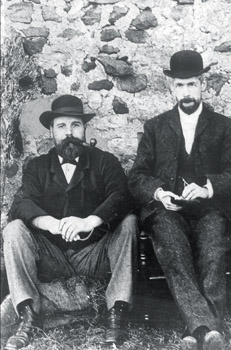Joseph Wright
Former Professor of Comparative Philology at
Oxford University, Joseph Wright taught himself
to read and write aged 15 and edited the
acclaimed English Dialect Dictionary. He studied
at the Mechanic’s Institute in the early 1870s
 Seventh son of a navvy, Joseph Wright was born in Thackley on
31 October 1855. He started his working life aged only 6 years
old as a donkey boy, taking tools from quarry-men to the local
blacksmith to be sharpened. Aged 7, he became a doffer in the
spinning department of Titus Salt’s Mill, replacing the full bobbins
with empty ones. Joseph briefly attended the mill school part time
where he learned the alphabet and very basic arithmetic. Later, he
gained an apprenticeship in another mill, as a wool-sorter as it was
better paid.
Seventh son of a navvy, Joseph Wright was born in Thackley on
31 October 1855. He started his working life aged only 6 years
old as a donkey boy, taking tools from quarry-men to the local
blacksmith to be sharpened. Aged 7, he became a doffer in the
spinning department of Titus Salt’s Mill, replacing the full bobbins
with empty ones. Joseph briefly attended the mill school part time
where he learned the alphabet and very basic arithmetic. Later, he
gained an apprenticeship in another mill, as a wool-sorter as it was
better paid.
Aged 15 and unable to read, he listened to the other workmen
reading accounts of the battles from the newspapers of the
Franco-Prussian War and wished he could read too. So using the
Bible and John Bunyan’s The Pilgrim’s Progress, he taught himself
to read and write.
He attended classes at the Mechanics Institute, and fascinated
by languages he first learned French and German. Aged only 18,
he established his own night school to help other disadvantaged
students.
By the age of 21, in 1876, he had managed to save up £40 to
study for a term at Heidelberg University in Germany. He found
employment as a Schoolmaster on his return to England, where he
continued his studies.
In February 1879, aged 23, he created The Dialect Test, an
early method he used to identify vowel sounds and features of
speech. He captured the main vowel sounds of a specific dialect
by listening to the reading of a short passage of 76 words, which
included all the categories of West Saxon words and vowels, and
noting the pronunciation and substitution of words.
He returned to Germany in 1882 for 6 years, where he gained a
PhD in Qualitative and Quantitative Changes of the Indo-Germanic
Vowel System in Greek at the University of Heidelberg in 1885. He
also studied, in German, at the University of Freiburg-in-Breisgau
and the University of Leipzig.
He was appointed Deputy Professor of Comparative Philology
at Oxford University in 1891, and then Professor of Comparative
Philology in 1901. Keen supporters of education for women, Joseph
and his wife Elizabeth held Sunday Yorkshire teas for 12 to 18
young women and men for 25 years at their Oxford home which
they named ‘Thackley’. He became Emeritus Professor in 1925.
A specialist in dialects and 15 languages, especially the Germanic
languages, Joseph was widely published during his lifetime and
for 50 years after his death. He wrote a range of introductory
grammars for Old English, Middle English, Old High German,
Middle High German and Gothic, and received his highest acclaim
for editing the 6 volume English Dialect Dictionary which he
started in 1887 and published between 1898 and 1905. It is still
regarded a definitive work, a snapshot of English dialect speech of
the late 19th century. During this period, a Canadian University
offered him a very generous salary of £500 per annum, which he
rejected, preferring to complete the dictionary.
When he published the Grammar of the Dialect of Windhill in
1893, he hailed it to be “The first grammar of its kind in England:
as scientific study of a living dialect intended to be useful to
philologists”. In 1894, he formed a committee to gather Yorkshire
dialect material, which led to the founding of The Yorkshire Dialect
Society in 1897, the world’s oldest dialect society still in survival.
Joseph was an important influence on many distinguished writers.
He tutored J R R Tolkien in the Grammar of the Gothic Language at
Oxford University, corresponded with Thomas Hardy whilst editing
English Dialect Dictionary and was greatly respected by Virginia
Woolf, who wrote of him, “The triumph of learning is that it leaves
something done solidly for ever. Everybody knows now about
dialect, owing to his dixery.”
Joseph died 27 February 1930, aged 74.
Photograph courtesy of the Telegraph & Argus, Bradford